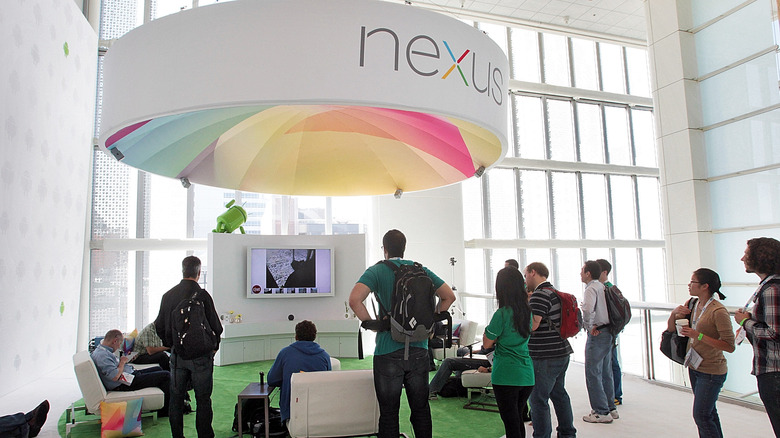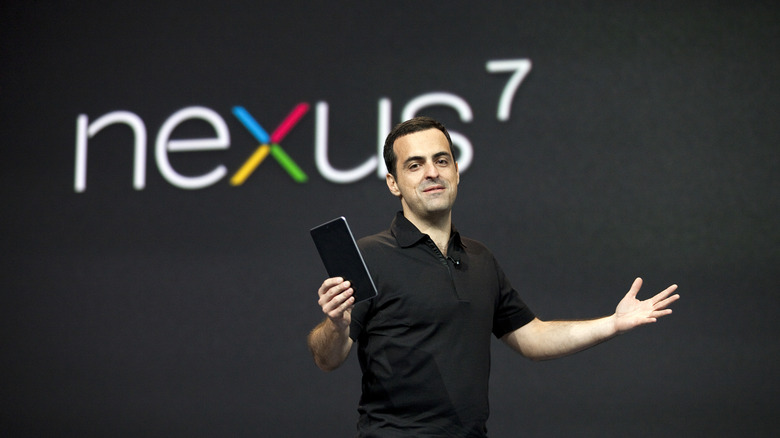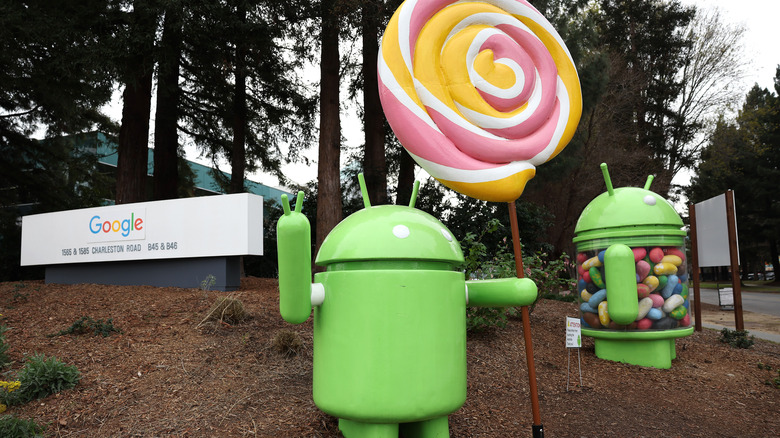Why Google Discontinued Its Nexus Line Of Smartphones
Google's Android has become some of the most popular smartphone software over the years, powering devices from more than a dozen companies including Samsung, Motorola, and HTC. Google also makes its own products, sold under the Pixel brand. But it wasn't always that way.
Back in 2010, Google worked with HTC to make the Google Nexus One, meant to market some of the best parts of what Android can do without additional features created by companies like Samsung, LG, and Motorola. The Nexus One design clearly took inspiration from the very first Android device, the HTC Dream, and it was an immediate hit with fans. From there, Google's teams worked with manufacturers to create more Nexus devices each year. Some of the most popular versions included the Samsung Galaxy Nexus in 2011, as well as tablets such as the Nexus 7 and 10. The company even used the Nexus brand for experiments like the Nexus Q streaming media device, which was a flop.
These days, many Android enthusiasts question why Google chose to kill the widely beloved Nexus line in 2016, in favor of a newly branded Pixel phones designed and manufactured by its own teams. For a lot of fans, Nexus devices were what made them fall in love with Android, and Pixels, while nice, don't feel quite the same. So, what happened? Here are all the reasons why Google discontinued its Nexus line of smartphones.
A brief history of Google Nexus
As mentioned above, the Nexus program began with the Google Nexus One in January of 2010. Made by HTC, the phone was praised for its speed and slender look. Google's Nexus S came later that year, manufactured by Samsung as the Korean conglomerate claimed dominance of the US Android market for the first time. By the time Samsung followed up with the Galaxy Nexus, it was clear that Google meant business with these devices.
Over the next several years, Google steadily released more devices. The peak seemed to be in 2012 and 2013 with the respective releases of the well-regarded Nexus 4 and Nexus 5, both made by LG. The former device had a sandwich design with glass on the front and back, and ergonomic rails in between that stood out next to the plastic Samsung favored back then.
Google was successful when it branched out into tablets too. The Nexus 7 was particularly well-liked, as well as its larger Nexus 10 sibling. Google found its Nexus line couldn't branch too far from smartphones though. Its bizarre and ill-fated Nexus Q media hub failed to catch on. Maybe it was the ominous orb shape, or its limitations to only stream media from Google's own services.
Whatever the case, Google lost its footing after that. Three more Nexus phones were released through 2015, including the Motorola-made Nexus 6 and Nexus 5X, and the Huawei-made Nexus 6P. But none of them got the same attention.
Nerds loved Nexus phones but newbies didn't care
If you have fond memories of Nexus smartphones, odds are you're something of a tech enthusiast — the kind of person who regularly reads sites like this one. At the time, it seemed the core fan base for Nexuses were Android purists who liked the devices because they ran Android without any third-party modifications, something they called the "stock" or "vanilla" Android experience.
However, despite the love Nexus devices received from Android fans, they struggled to get the attention of casual smartphone buyers, who were buying other devices in part because they didn't know the difference between HTC Sense and stock Android. The people just upgrading their smartphone ultimately picked other devices.
Despite Google's strong branding, the company's struggled to convince people to buy its phones. Google devices represented a fraction of the market at the start of 2016, just before the first Pixel devices launched. Today, the search giant's share has increased, but it still only accounts for less than 5% of overall industry sales, which isn't anything to gloat about.
Google didn't just ditch the Nexus name because of poor sales though. The move to Pixel phones came at a time of major shakeups inside the company, as it pivoted toward a new strategy, embracing not just home-made devices but also specifically including chips to help with AI.
Google's Android strategy after Nexus
Nexus devices were never aimed at the mainstream market the way Pixels are today. Instead, they were meant to be geek-friendly flagships. Pixels served that same purpose while also offering consumer-friendly features like AI-powered computational photography and enhanced smart assistant features.
Ultimately, executives at the company said they wanted more control over the hardware. When the first Pixels launched, Google's Android chief Hiroshi Lockheimer told Bloomerg that Google's teams will take Pixels "to a level of completion, polish, thoroughness that a platform by itself in abstract won't get. That's a pretty big shift."
The Nexus phones may have been Google devices, but they were manufactured by a rotating cast of smartphone hardware makers. That was always a shaky arrangement, as Google could easily be accused of playing favorites with a particular manufacturer each year. With the Pixel, Google was suddenly competing head-to-head with those same companies, trusting that Android's dominance over the global market would prevent one of them from defecting to a different software platform.
Killing products is business as usual for Google
Most longtime Google watchers weren't surprised when the company killed its Nexus line of smartphones. Google has always been more willing than many companies to kill off any products that aren't beneficial enough to its strategy or bottom line. To get a sense of the wide variety of things Google has sent out to pasture, you can look at the Killed by Google webpage, which has nearly 300 products that have been discontinued. In 2024 alone, the company has axed Jamboard, VPN by Google One, DropCam, Google Podcasts, and Keen. In 2023, Google killed off more than a dozen products including its web hosting service called Google Domains, and Google Stadia, its game streaming service. When it came to doing away with the Nexus brand, Google at least replaced it with the Pixel. The search giant's penchant for pruning products has become so pervasive that many tech pundits precautioned against taking Google at its word when it promised seven years of Android updates for the Pixel 8 devices last year.
But in the ways that matter, the Pixel brand is just like Nexus. They're a place for Google to lead by example, demonstrating what it believes the ideal Android experience should be. They also offer a place for Google to experiment with its latest, most cutting edge features. The Nexus brand holds a special place in Android enthusiasts' hearts, but the future with Pixel looks just as bright.




